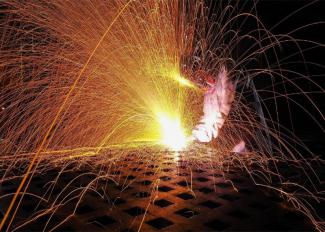The U.S. Department of Energy’s (DOE) Office of Fossil Energy (FE), NETL and the Appalachian Regional Commission (ARC) are partnering through an interagency agreement that establishes a job-training program to help create a high-tech workforce with advanced welding skills to install and service superalloy components in next-generation fossil-fueled power plants and meet the demand for welders with similar skills in the automotive and aerospace industries.
The agreement, signed on Aug. 5, 2020, transferred $500,000 from DOE’s Office of FE to ARC. NETL will manage the program in partnership with ARC, the federal economic development agency that serves West Virginia and portions of 12 other states in Appalachia.
Those enrolled in the program will learn advanced techniques in several areas, including the use of gas tungsten arc welding and technologies for joining cobalt- and nickel-based superalloys in power plants that operate at extreme temperatures and pressure levels. Other training will focus on robotics and advanced manufacturing skills to prepare workers for long careers in growing or emerging industries.
The agreement is expected to produce a well-trained workforce for good-paying jobs that support cleaner coal and gas power plants across Appalachia, a region that stretches from southern New York to northern Mississippi.
Briggs White, Ph.D., NETL technology manager for the Office of FE’s High Performance Materials program, also maintains the skills learned will be broadly applicable to other value-added industries such as automotive and aerospace, which should have a positive impact in areas of Appalachia.
Advanced power plants operate at significantly higher temperatures and pressures, which increases efficiency and lowers emissions of carbon dioxide (CO2). Those conditions require advanced materials, such as superalloys, to withstand harsh operating environments that cause corrosion and other forms of damage.
“There is a need is to develop a workforce of welders with the high-tech skills to use these superalloys so utilities can produce cleaner electricity from highly efficient coal and gas power plants that run at extreme temperature and pressure levels,” White said.
White pointed out that joints between various power plant components can fail during cycling (the operation of electric generating units at varying load levels based on power demand), making it critical that joints be made as strong as possible during initial manufacture and installation. When welds do fail, they need to be repaired in a quality, timely manner using advanced alloys and welding techniques to get the power plant back online as quickly as possible to minimize impacts to the power grid.
In partnership with the Advanced Ultrasupercritical Materials Consortium, led by Energy Industries of Ohio, NETL and DOE FE have led development and manufacturing of advanced alloys needed for transformational power technologies.
The program has worked with industry, academia and national laboratories, including NETL’s Albany, Oregon, research site, to advance the science and engineering of advanced alloys for fossil applications with a strong focus on enhancing the nation’s high-temperature materials supply chain. In this new partnership with ARC, the accumulated cutting-edge knowledge and skills will be translated to practice through workforce training and outreach.
NETL and the Office of FE recently issued a request for information to identify the most pressing workforce needs and gaps, match skills with employment needs and establish training programs and curricula.
Information from industry, research universities and laboratories, government agencies and other stakeholders to address these workforce challenges will be helpful to begin the program.
Training could be offered in several ways. For example, industry may offer apprenticeships while junior colleges could create programs to prepare a workforce that addresses both immediate demands and strengthens lasting capacity for fossil fuel applications.
For more program information, email advancedwelding@arc.gov.
The U.S. Department of Energy’s National Energy Technology Laboratory develops and commercializes advanced technologies that provide reliable and affordable solutions to America’s energy challenges. NETL’s work supports DOE’s mission to advance the national, economic and energy security of the United States.




